雅思口语part3观点类问题详解
雅思口语part3问题总结与解析

雅思口语part3问题总结与解析第一篇:雅思口语part3问题总结与解析雅思口语part3问题总结与解析为了大家能更好的备考雅思考试,前程百利雅思小编特为大家整理雅思口语part3问题总结与解析,包了最新雅思听说读写备考资料,以及最权威的参考书,处于备考中的考生们,还等什么呢!1.原因论述类考题:在回答这种类型的雅思口语考题时,----问题的重点,且一定要紧扣此重点, 不能游离出去------探寻原因,这样,思路就能更加开阔,更能做到有话可说。
比如下面这道题:what is the reason why so many people want to become famous?参考答案:I believe many people want to become famous for two reasons.The first reason is if they become famous, they can make a lot of easy money and they can make their life easier.The second reason is they can make powerful friends and they will be powerful enough to protect their friends and family better.非常高频的出现一些因果的表达法,如because, due to, owing to, the reason why...is that..., contribute to, lead to, give rise to, be attributed to, result from 等。
2.情况对比类考题:这类题目说穿了就是对于正反两面的讨论。
因此,经常用到的词就有 advantages, benefits, merits, upsides, plus points, disadvantages, drawbacks, downsides, minus points 等。
雅思口语Part 3备考技巧详解
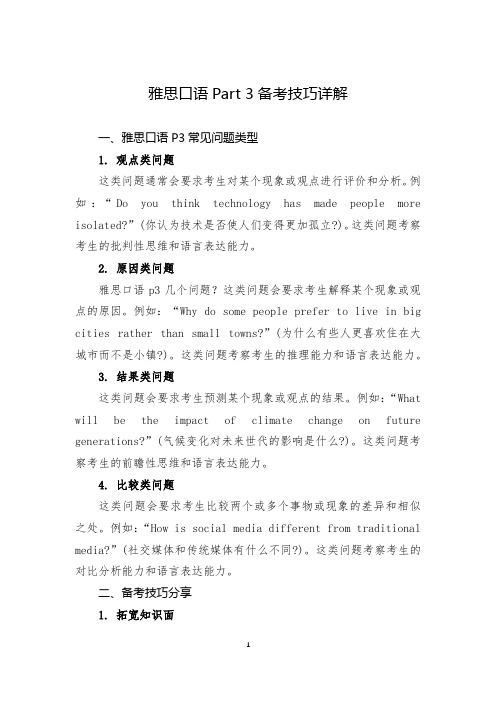
雅思口语Part 3备考技巧详解一、雅思口语P3常见问题类型1. 观点类问题这类问题通常会要求考生对某个现象或观点进行评价和分析。
例如:“Do you think technology has made people more isolated?”(你认为技术是否使人们变得更加孤立?)。
这类问题考察考生的批判性思维和语言表达能力。
2. 原因类问题雅思口语p3几个问题?这类问题会要求考生解释某个现象或观点的原因。
例如:“Why do some people prefer to live in big cities rather than small towns?”(为什么有些人更喜欢住在大城市而不是小镇?)。
这类问题考察考生的推理能力和语言表达能力。
3. 结果类问题这类问题会要求考生预测某个现象或观点的结果。
例如:“What will be the impact of climate change on future generations?”(气候变化对未来世代的影响是什么?)。
这类问题考察考生的前瞻性思维和语言表达能力。
4. 比较类问题这类问题会要求考生比较两个或多个事物或现象的差异和相似之处。
例如:“How is social media different from traditional media?”(社交媒体和传统媒体有什么不同?)。
这类问题考察考生的对比分析能力和语言表达能力。
二、备考技巧分享1. 拓宽知识面为了在雅思口语P3环节中更好地应对各种问题,考生需要拓宽自己的知识面,关注时事热点、社会现象、科技发展等方面的信息。
这样可以帮助考生更好地理解问题,提供更深入的分析和见解。
2. 培养逻辑思维能力逻辑思维能力是雅思口语P3环节的重要考察点。
考生可以通过阅读逻辑推理类文章、参加辩论活动等方式培养自己的逻辑思维能力。
同时,在备考过程中,也要注重练习如何用逻辑清晰、条理分明的语言表达自己的观点。
雅思口语part3重要决定话题分析
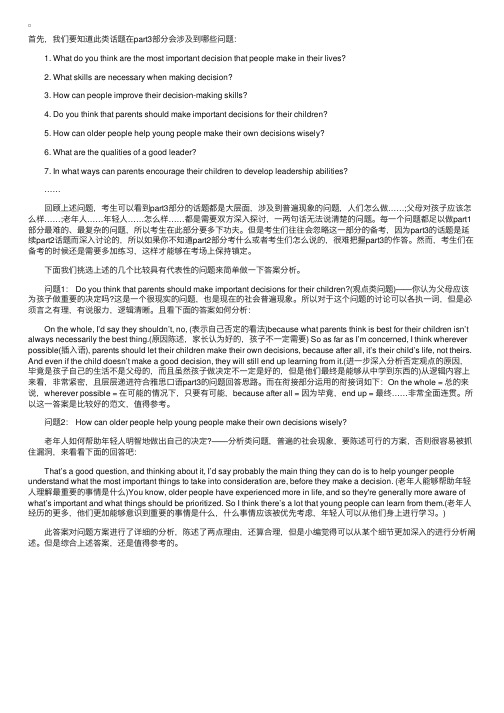
⾸先,我们要知道此类话题在part3部分会涉及到哪些问题: 1. What do you think are the most important decision that people make in their lives? 2. What skills are necessary when making decision? 3. How can people improve their decision-making skills? 4. Do you think that parents should make important decisions for their children? 5. How can older people help young people make their own decisions wisely? 6. What are the qualities of a good leader? 7. In what ways can parents encourage their children to develop leadership abilities? …… 回顾上述问题,考⽣可以看到part3部分的话题都是⼤层⾯,涉及到普遍现象的问题,⼈们怎么做……;⽗母对孩⼦应该怎么样……;⽼年⼈……年轻⼈……怎么样……都是需要双⽅深⼊探讨,⼀两句话⽆法说清楚的问题。
每⼀个问题都⾜以做part1部分最难的、最复杂的问题,所以考⽣在此部分要多下功夫。
但是考⽣们往往会忽略这⼀部分的备考,因为part3的话题是延续part2话题⽽深⼊讨论的,所以如果你不知道part2部分考什么或者考⽣们怎么说的,很难把握part3的作答。
然⽽,考⽣们在备考的时候还是需要多加练习,这样才能够在考场上保持镇定。
下⾯我们挑选上述的⼏个⽐较具有代表性的问题来简单做⼀下答案分析。
问题1: Do you think that parents should make important decisions for their children?(观点类问题)——你认为⽗母应该为孩⼦做重要的决定吗?这是⼀个很现实的问题,也是现在的社会普遍现象。
雅思口语Part3详解

雅思口语Part3详解今天五月花留学将给各位烤鸭详细解析雅思口语Part3。
Part3是Part2的延伸,问题范围和Part2一致。
比起Part1的生活类问题,Part3的问题更有深度和广度,它的本质是讨论,此部分考察学生的辩证性思维以及论证能力。
Part 1:雅思口语Part3介绍Part2:雅思口语Part3答题关键Part3的问题答题时有2个很重要的原则,一是Speak at length,二是站在多个角度答问题。
1. 个人观点类问题此类问题大致如下:你认为…怎么样?你做过…吗?你认为…重要吗?一些人认为…,你同意吗?如果…你会怎么做?这类型的问题考察的是个人经验,对某个事物的看法,即描述某事某物的重要性/意议/价值等。
个人观点类问题答题时可以有三种角度:*No1. 正面出击。
(从正面阐述+举例。
)*No2. 反例法。
(从反面论证一件事物的重要性,即如果没有这个东西或者不做这件事会有什么不好的影响。
)*No3. 正+反结合。
(正面说一点,反面说一点)2. 差异对比类问题雅思口语Part3很喜欢问对比类的话题,可以细分为三大类:①事物对比答题可以有两种方式:*思路1:introduction(答案的开头句)+A的特点/优缺点+B的特点/优缺点+example(举一个具体的例子来解释A和B之间的差异)或者:*思路2:introduction+ A的特点/优缺点&example+ B的特点/优缺点&example+ reasons(具体解释一下产生A和B之间差异的原因)②人群对比答题:此类问题考察不同人群对待同一件事物或某种现象的看法,即你对二者人生观与态度的认知。
答题时需要站在不同的人物角度来作答:Introduction+For men...+From the women’s perspective ...+Conclusion.③时间对比答题:涉及时间类的问题主要考察事物的发展过程、发展趋势并未来展望(potential),答题时:有对比现象(如:以前的交流工具和现在的交流工具有什么不同?),两个时间段都描述,描述事物特征、样子;无对比现象,分点阐述,注意逻辑、时态。
雅思口语part 3 答题思路实例解析
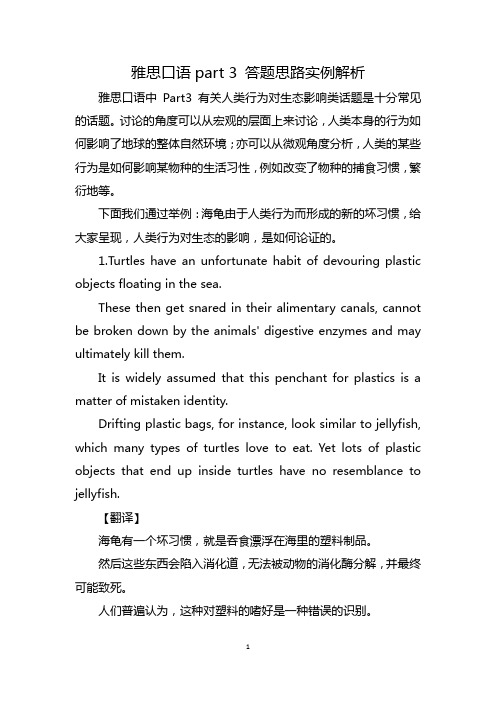
雅思口语part 3 答题思路实例解析雅思口语中Part3有关人类行为对生态影响类话题是十分常见的话题。
讨论的角度可以从宏观的层面上来讨论,人类本身的行为如何影响了地球的整体自然环境;亦可以从微观角度分析,人类的某些行为是如何影响某物种的生活习性,例如改变了物种的捕食习惯,繁衍地等。
下面我们通过举例:海龟由于人类行为而形成的新的坏习惯,给大家呈现,人类行为对生态的影响,是如何论证的。
1.Turtles have an unfortunate habit of devouring plastic objects floating in the sea.These then get snared in their alimentary canals, cannot be broken down by the animals' digestive enzymes and may ultimately kill them.It is widely assumed that this penchant for plastics is a matter of mistaken identity.Drifting plastic bags, for instance, look similar to jellyfish, which many types of turtles love to eat. Yet lots of plastic objects that end up inside turtles have no resemblance to jellyfish.【翻译】海龟有一个坏习惯,就是吞食漂浮在海里的塑料制品。
然后这些东西会陷入消化道,无法被动物的消化酶分解,并最终可能致死。
人们普遍认为,这种对塑料的嗜好是一种错误的识别。
例如,漂浮的塑料袋看起来就像许多海龟喜欢吃的水母。
【思路】对于这类话题,我们首先可以阐述事实情况,然后展现出大多数人的一种普遍想法,最后通过科学的研究来展现出导致该事实发生的真实原因。
雅思口语之Part3考试题型归纳
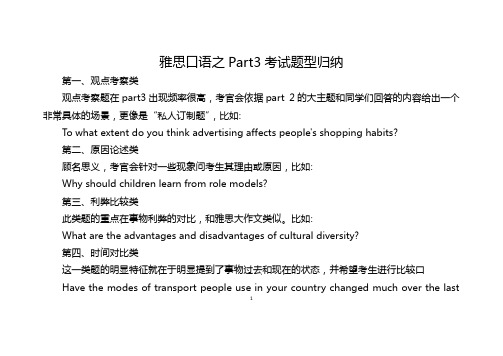
雅思口语之Part3考试题型归纳第一、观点考察类观点考察题在part3出现频率很高,考官会依据part 2的大主题和同学们回答的内容给出一个非常具体的场景,更像是“私人订制题”,比如:To what extent do you think advertising affects people's shopping habits?第二、原因论述类顾名思义,考官会针对一些现象问考生其理由或原因,比如:Why should children learn from role models?第三、利弊比较类此类题的重点在事物利弊的对比,和雅思大作文类似。
比如:What are the advantages and disadvantages of cultural diversity?第四、时间对比类这一类题的明显特征就在于明显提到了事物过去和现在的状态,并希望考生进行比较口Have the modes of transport people use in your country changed much over the last1few decades?第五、情况对比类这种题目通常是两方的对比,比如两种不同场景的比较,或者是两类不同人群的比较!Are women more fashionable than men?第六、预测未来类这类题一般会要求考生对未来进行展望,用的时态也基本上都是未来时!Do you think online shopping will replace in-store shopping in the future?第七、解决问题类这类考题通常会要求考生对某些社会问题提出解决方案,比如:What can people do to reduce water pollution?第八、影响效果类这一类题目就会要求考生描述清楚事物的影响:How does modern technology influence friendship?2。
雅思口语Part3如何应对观点比较题

雅思口语Part3如何应对观点比较题雅思口语Part3考官有时候会问Why do some people think….while others disagree….?建议考生在说的时候可以将不同人群分类,然后给出具体支持的理由或者例子。
下面就和大家分享雅思口语Part3如何应对观点比较题,来欣赏一下吧。
雅思口语Part3如何应对观点比较题?1、解题思路考生们可以选择将人分为不同的类型,比如按年龄,按职业,按性别,按人群等等。
也就是所谓的“分类讨论”,将不同人群分完类之后,给出具体支持的理由或者例子。
2、常用表达分类Nearly everyoneAlmost everybodyThe vastmajorityof peopleMost peopleSome peopleA few peopleElderly people/retied peopleWorking people/office workersVery active people/sporty peopleReligious peopleAnimal loversFood loversPeople with…,( creative talent/a lot of energy)People who (have an interest in art)连接词:While/yet/however/although/conversely表述原因:Some people think….Becauseit’s…..(convenient/important/i nteresting/beneficial/healthy/reward ing/challengening/unnecessary/a waste of time)3、例子:Why do some people choose not to eat meat?In my country, nearly everyone enjoys meat. However, some people, mainly Buddhists and young people who are members of animal rights movement, make a concerted effort not to eat meat. They believe animals have the same rights as us humans. Although some scientists say it’s important to eat meat for health reasons, others claims that if you eat the right vegetables and fruits, eating meat is not necessary to maintain a good standard of health.接下来的几道题目烤鸭们可以自己进行练习:1. Why do more and more people in China want to own their own car?2. Why do some people do dangerous jobs?3. Why do you think people in your country like to spend a lot of money on wedding celebrations?雅思口语Part2物品类题库:有关健康的*Describe an article you read about healthy life.You should say:where you read it fromwhen you read itwhat the article was aboutand explain what you thought of this article.I don’t usually read much about health, I’m not a fitness fanatic but I try to keep reasonably healthy with a little bit of exercise and by eating a balanced diet. However, there was one article that grabbed my attention recently, about sugar.I often surf the internet and look at news websites in my spare time, I like to keep up to date with what’s going on in the world. More often than not an article will have links to other articles down the side or at the bottom of the page, so you can spend hours going from one to another.About a month ago, during the recent athletics championships in Beijing, I was reading an article about sport when a link to another article caught my eye. It was describing how for years。
雅思口语Part3问题解析和答题策略

雅思口语Part3问题解析和答题策略
雅思口语Part 3问题解析和答题策略
一:简介
如果雅思考生们口语想要达到6分的水准,除了第一部分和第二部分需要做充分的准备之外,第三部分需要有对策性的'准备。
最近有一些雅思考生在课堂上分享考试感想时候表示雅思口语考试地第二部分难度最大,而第一部分和第三部分都是一问一答式对话形式,答题对策没有什么区别,其实对于口语达到6分的考生而言,这是个错误的理解。
对于第一部分和第三部分,除了问答形式相同之外,我们由浅入深地来了解下第一部分和第三部分有什么区别并且怎么样有针对性地准备第三部分。
有技巧,有针对性地准备第三部分会让雅思6分变得不再感到就差那么一点点。
第一部分和第三部分的区别
第一部分
个人生活经历为主题
举例为个人生活经历
相对注重内容
第三部分
社会现象问题为主题
举例不可为个人生活经历
逻辑词使用非常重要
相对更加注重结构
第三部分答题技巧
由于第三部分并不像第一部分和第二部分,有题库可以做好充分的准备,第三部分的题库量是巨大的。
另外第一部分和第二部分考生们可以将个人生活中多姿多彩的经历作为素材合理结合话题进行回答。
对于第三部分,问题都是相对较为抽象概念的社会性问题,在短时间
的思考。
所以把时间花在题海战术上,把备考重心放在题型研究和答案结构整理上更为合理,那么让我们来看看第三部分答题的题型和答题技巧。
雅思口语part3答题技巧
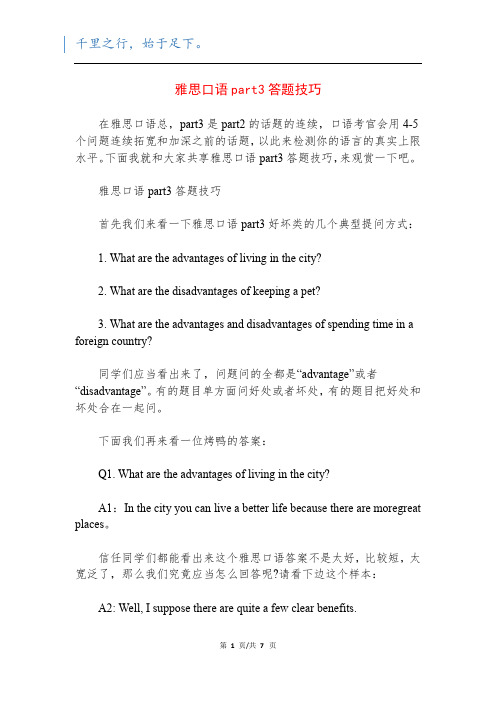
雅思口语part3答题技巧在雅思口语总,part3是part2的话题的连续,口语考官会用4-5个问题连续拓宽和加深之前的话题,以此来检测你的语言的真实上限水平。
下面我就和大家共享雅思口语part3答题技巧,来观赏一下吧。
雅思口语part3答题技巧首先我们来看一下雅思口语part3好坏类的几个典型提问方式:1. What are the advantages of living in the city?2. What are the disadvantages of keeping a pet?3. What are the advantages and disadvantages of spending time in a foreign country?同学们应当看出来了,问题问的全都是“advantage”或者“disadvantage”。
有的题目单方面问好处或者坏处,有的题目把好处和坏处合在一起问。
下面我们再来看一位烤鸭的答案:Q1. What are the advantages of living in the city?A1:In the city you can live a better life because there are moregreat places。
信任同学们都能看出来这个雅思口语答案不是太好,比较短,太宽泛了,那么我们究竟应当怎么回答呢?请看下边这个样本:A2: Well, I suppose there are quite a few clear benefits.First, an obvious advantage is that you can enjoy a more colorful life.For example, the subway will bring you a lot of convenience and the shopping malls can add funto your life. Second, the city can also provide you with better educational resources. You know, the schoolsare equipped with modern facilities and qualified teachers, which enable you to get a bettereducation.雅思口语part3答案2和答案1相比究竟好在哪里呢?当然长度变长了,但更重要的是,答案2用更具象的例子把答案1中的“a lot of great places”详细地从“购物广场”和“学校”描述。
2023雅思口语part 3 话题

2023雅思口语part 3 话题1. 现实问题与理论分歧在日常生活和学术领域,我们经常会遇到现实问题与理论之间的分歧。
对于这个话题,我们可以从不同的角度来探讨这个问题。
2. 现实问题和理论之间的关系对于很多人来说,现实问题和理论之间似乎存在着一种鸿沟。
他们认为现实问题更加紧迫和具体,而理论则显得抽象和遥远。
然而,理论作为一种总结和抽象的思维方式,能够帮助人们更好地理解和解决现实问题。
在学术研究中,理论更是不可或缺的工具,它可以引导研究者观察和分析现实问题,从而找到相应的解决办法。
3. 现实问题和理论的互动另现实问题也会不断地推动理论的发展。
许多重大的科学发现都是源于对现实问题的思考和实践中的验证。
通过与现实问题的互动,理论可以不断地进行修正和更新,从而更加贴合实际情况。
4. 现实问题与理论的结合对于现实问题和理论的关系,我们可以认为二者并不是彼此孤立的,而是相互通联、相互促进的。
在解决现实问题的过程中,理论可以提供宏观的指导,而对现实问题的观察和实践则可以为理论的建构提供基础。
在学术研究和实践中,现实问题和理论的结合是十分重要的,只有在二者相互促进的基础上,才能有更好的成果。
5. 结语现实问题和理论之间并不是对立的关系,而是相互通联、相互促进的。
在解决现实问题和推动理论发展的过程中,我们需要正确对待这两者的关系,用理论来指导实践,用实践来检验理论,从而不断地推动人类社会的进步和发展。
对“现实问题与理论分歧”这一话题,我们可以从不同的角度来探讨,比如现实问题和理论之间的关系、现实问题与理论的互动以及现实问题与理论的结合等方面。
我们也可以深入挖掘这一话题的意义、影响和解决方法。
1. 现实问题和理论的关系在我们日常生活和学术研究中,现实问题和理论之间是密不可分的。
理论是对现实问题的概括和总结,可以帮助人们更好地理解现实问题,从而寻找解决办法。
当然,有些人认为理论是太过抽象,离实际生活太远,难以应用到具体的现实问题中。
雅思口语详解Part3答题技巧

雅思口语详解Part3答题技巧雅思口语详解Part3答题技巧一.雅思口语Part3难点解析都说雅思口语Part3难,那么雅思口语Part3难在哪里?它的难点是什么呢?我们来详细分析一下。
1.问题更有深度先来说雅思口语Part3的第一个难点,问题。
Part3的问题不同于part1和Part2,问题更有深度。
比如你在Part2谈论了旅行,那么接下来可能会问你旅游业的利弊,或者问你交通的利弊等等。
这些话题有的听起来可能跟part1相似,但却问的是更为深层次的内容。
有的时候一些Part3的问题可能会让你一时无法想出合适的回答。
总之,这个阶段难度上升最能直观感受到的就是口语问题难度增加。
2. 答题要求更高雅思口语Part3不仅问题更有深度,对于回答的要求更高了,此时决不能一句话回应考官的问题,建议举出实例说明观点。
比如,当问到关于城市的话题时,考官问你,你觉得住在城市有什么好处?如果你只用一句话“城市生活给人们生活提供了极大的便利”回应问题,那么口语分数肯定高不了。
你要根据问题去具体地具体说明为什么生活在城市生活会便利,比如交通更方便,购物更方便,上学更方便等等。
一定要注意,这一题答题要求更高,不能一两句就敷衍过去。
3.没有准备时间虽然Part3要求大家尽可能答的具体,但是考试中并没有给大家预留出额外的准备时间,考官问完问题后,你就要立刻根据问题来回答,几乎没有思考时间。
这也是雅思口语Part3的难点之一。
二.雅思口语Part3答题技巧解析1.创造准备时间我们在上文中提到,雅思口语Part3几乎没有思考时间,要根据问题立刻回应考官,大家要依靠一些技巧去给自己争取一些思考时间。
最为实用的方式就是重复问题,但是不能原句重复,要学着用Paraphrasing 的技巧去重复问题,这样就能为自己争取到一些思考时间。
如果对于所问话题一点思路也没有的话,不要沉默,可以开口讲“让我考虑一下……”讲完以后可以考虑几秒钟,迅速组织答案回答问题。
雅思口语Part3如何应对观点比较题

雅思口语Part3如何应对观点比较题雅思口语Part3考官有时候会问Why do some peoplethink….while others disagree….?建议考生在说的时候可以将不同人群分类,然后给出详细支持的理由或者例子。
下面我就和大家共享雅思口语Part3如何应对观点比较题,来观赏一下吧。
雅思口语Part3如何应对观点比较题?1、解题思路考生们可以选择将人分为不同的类型,比如按年龄,按职业,按性别,按人群等等。
也就是所谓的“分类争论”,将不同人群分完类之后,给出详细支持的理由或者例子。
2、常用表达分类Nearly everyoneAlmost everybodyThe vastmajorityof peopleMost peopleSome peopleA few peopleElderly people/retied peopleWorking people/office workersVery active people/sporty peopleReligious peopleAnimal loversFood loversPeople with…,( creative talent/a lot of energy)People who (have an interest in art) 连接词:While/yet/however/although/conversely表述缘由:Some people think….Becauseit’s…..(convenient/important/interesting/beneficial/healthy/rewarding/challengening/unnecessary/a waste of time)3、例子:Why do some people choose not to eat meat?In my country, nearly everyone enjoys meat. However, some people, mainly Buddhists and young people who are members of animal rights movement, make a concerted effort not to eat meat. They believe animals have the same rights as us humans. Although some scientists say it’s important to eat meat for health reasons, others claims that if you eat the right vegetables and fruits, eating meat is not necessary to maintain a good standard of health.接下来的几道题目烤鸭们可以自己进行练习:1. Why do more and more people in China want to own their own car?2. Why do some people do dangerous jobs?3. Why do you think people in your country like to spend a lot of money on wedding celebrations?雅思口语Part2物品类题库:有关健康的文章Describe an article you read about healthy life.You should say:where you read it fromwhen you read itwhat the article was aboutand explain what you thought of this article.I don’t usually read much about health, I’m not a fitness fanatic but I try to keep reasonably healthy with a little bit of exercise and by eating a balanced diet. However, there was one article that grabbed my attention recently, about sugar.I often surf the internet and look at news websites in my spare time, I like to keep up to date with what’s going on in the world. More often than not an article will have links to other articles down the side or at the bottom of the page, so you can spend hours going from one to another.About a month ago, during the recent athletics championships in Beijing, I was reading an article about sport when a link to another article caught my eye. It was describing how for years people had thought fat was making people overweight and so food companies would bring out lots of low-fat products that were supposed to be healthier, such aslow-fat yoghurt or soft drinks. But in fact, these products are higher in sugar, and sugar is now thought to be worse for your health than fat.I have no idea whether the article was right or not, but it certainly made me think about my sugar intake. It also made me think about people’s diet in general, with more and more kids eating sugary snacks and enjoying more Western junk food like KFC and McDonalds. I think it’s important to have these articles and documentary films that highlight the issues raised by the articles. Soon we might have a big problem with obesity, like the U.S.雅思口语Part 2新题范文之礼貌的场合Describe a situation where you have to be politeYou should say:What it isWhat did you do to be politeWhy did you have to be politeAnd explain how you felt about it afterwards1-4月雅思口语新题part2范文之:礼貌的场合(a situation where you have to be polite)Ok, well I would actually like to start by saying that I try to be polite in all situations, because that was basically how I was brought up, but if I was to choose a particular occasion when I had to be polite, then I’ll talk about the time I went to a friend’s house for their birthday party.And as for when it was, well I suppose it must have been about three or four months ago, and basically what happened was that a friend of mine invited me, along with a few other of his friends, to his house for dinner to celebrate his birthday with him. And when we got there, we were given a nice welcome by his parents, who then offered us some drinks and took us through to the living room to wait for a bit while they finished preparing the dinner. Anyway, it was worth the wait, because the dinner was fantastic, and by the end of it, I was absolutely stuffed!So regarding why I had to be polite, well, I think it goes without saying that whenever you go to someone else’s house, you should always be polite, you know, it’s common sense, because I mean, if someone’s kind enough to invite you to their home and treat you to food and drink, the least you can do is be polite and well-mannered, and if you’re not, then chances are that you won’t get invited back!You know, I think it’s safe to say that we’ve all experienced times when someone hasn’t behaved very well when they’ve been a guest at our home, and usually when that happens, the first thing we say to each other when that person’s left is, “there’s no way they’re ever coming back!”. Of course for young children it’s different, but for adults there’s no excuse at all. And if you do make the effort to be polite, then it makes a big difference, because then you’ll leave a very good impression and consequently be welcome as a guest again in the future.So yeah, I guess that’s pretty much all there is to say, so thanks for listening.雅思口语Part3如何应对观点比较题文章到此就结束了,欢迎大家下载使用并丰富,共享给更多有需要的人。
雅思口语Part3Ambition问题分析
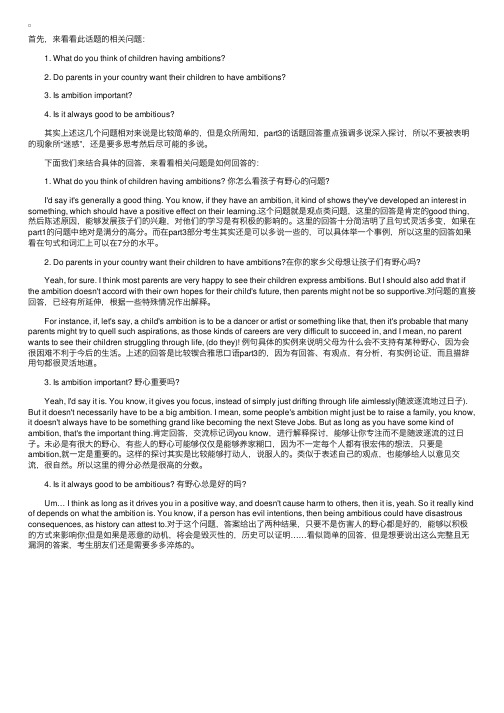
⾸先,来看看此话题的相关问题: 1. What do you think of children having ambitions? 2. Do parents in your country want their children to have ambitions? 3. Is ambition important? 4. Is it always good to be ambitious? 其实上述这⼏个问题相对来说是⽐较简单的,但是众所周知,part3的话题回答重点强调多说深⼊探讨,所以不要被表明的现象所“迷惑”,还是要多思考然后尽可能的多说。
下⾯我们来结合具体的回答,来看看相关问题是如何回答的: 1. What do you think of children having ambitions? 你怎么看孩⼦有野⼼的问题? I'd say it's generally a good thing. You know, if they have an ambition, it kind of shows they've developed an interest in something, which should have a positive effect on their learning.这个问题就是观点类问题,这⾥的回答是肯定的good thing,然后陈述原因,能够发展孩⼦们的兴趣,对他们的学习是有积极的影响的。
这⾥的回答⼗分简洁明了且句式灵活多变,如果在part1的问题中绝对是满分的⾼分。
⽽在part3部分考⽣其实还是可以多说⼀些的,可以具体举⼀个事例,所以这⾥的回答如果看在句式和词汇上可以在7分的⽔平。
2. Do parents in your country want their children to have ambitions?在你的家乡⽗母想让孩⼦们有野⼼吗? Yeah, for sure. I think most parents are very happy to see their children express ambitions. But I should also add that if the ambition doesn't accord with their own hopes for their child's future, then parents might not be so supportive.对问题的直接回答,已经有所延伸,根据⼀些特殊情况作出解释。
雅思口语part3常见问题类型分析

雅思口语part3常见问题类型分析雅思口语part3的备考是很难把握的,因此也很容易被考生们忽略。
其实雅思口语part3常见问题类型考生还是可以了解一下的,以便在答题的时候能够心中有数,不自乱阵脚。
雅思口语part3常见问题类型分析1. 雅思口语part3分析类问题所谓分析类问题,其实就是指在part3中就某个事物或者观点而言的好的和不好的方面。
基于每个事物都有它自身的好坏两方面,所以一般这类问题大家不怕没得说,先说说好的方面,再调侃一下不好的地方就可以了。
当然,同学们也没有必要一定要两方面都说,只要说得自然,能说到点子上就好。
但是切记答案要饱满,语言要精准。
这类问题通常有两类问法,所以大家只要记住这类题型的关键词,按照下面的思路回答就能很好的应对了。
Interviewer:A: How do you feel about…?/What do you think of…?B: What are the advantages and disadvantages of ...?Interviewee: ...has always been the topic that is widely talked about and debated. It has its distinct advantages and disadvantages. Let me get started from the bright side. Speaking off the top of my head, another benefit is...and of course, we cant ignore its down side. The first thing is..., another disadvantage that springs to mind is...I think these are two sides of the same coin.可以看出在问题的方式上并不唯一,所以考生要会分辨并理解这类考题。
雅思口语part3观点类话题如何作答

⾸先,我们以下列问题为例来具体看⼀下: Do you think you can learn anything about a person from the clothes they wear? “你认为从⼀个⼈的⾐着上能够了解⼀个⼈吗?”针对这类问题的回答⼀般都是先表明对问题的看法,在针对⾃⼰的观点进⾏陈述分析。
如下: I think you can learn a fair amount, yeah. 表明⾃⼰的观点。
You can learn…… You know(交流标记词,给⼈交流沟通的感觉), if you see someone walking down the street in a suit, then I think it’s pretty safe to assume that they have an office job of some sort. (Of course that might not be the case, but there’s a pretty good chance it is.)假如在⼤街上看到⼀个穿制服的⼈,那么你就会觉得很安全,或者判断他是在办公室⼯作…… And also, if you see someone dressed immaculately, you know, with shiny shoes and no creases on their clothes, then I think you can deduce that that person cares a lot about their appearance and pays a lot of attention to detail, which can’t be said for people who walk around in old, dirty clothes!如果看到⼀个⼈穿着⼲净整洁,穿着善良的鞋⼦,没有褶皱,那么你则会认为他是⼀个很注重外表的⼈,会注重很多细节……所以从这两点来看,从⼀个⼈的⾐着是可以了解他是怎么样的⼀个⼈的。
- 1、下载文档前请自行甄别文档内容的完整性,平台不提供额外的编辑、内容补充、找答案等附加服务。
- 2、"仅部分预览"的文档,不可在线预览部分如存在完整性等问题,可反馈申请退款(可完整预览的文档不适用该条件!)。
- 3、如文档侵犯您的权益,请联系客服反馈,我们会尽快为您处理(人工客服工作时间:9:00-18:30)。
雅思口语part3观点类问题详解
首先,考生需要明白什么是观点类问题。
前面我们已经为大家介绍过度析类问题,是对一个问题的正反两
方面或者事物的优缺点实行分析,然后总结。
而观点类的题目实际上
是由分析类题目派生出来的,是直接表达自己观点的一种问题,问题
的模式有着标志性的提示词如,“Should...do...? Explain why.”
所以,显然,这类话题的一个十分明显的标识单词就是“Should”。
也就是说考试的时候只要遇到是否应该怎么样的时候?考生应该马上能
够反映出来是对于观点的询问,所以考生只需要就问题本身来说从一
方面讲述自己的观点即可。
此处区别于分析类问题是很明显的,而且
要比分析类问题简单很多。
当然,在这个环节上考生同样要做到对各
个方面分析到位、深入、精准。
然后,观点类问题的提问方式也是考生必须了解的。
上面说了,观点类问题是有标志性的提问词的,所以理解起来并
不复杂,一般的提问方式就是:Should ...do...? And explain why.
即是否……?然后解释为什么。
这样咋一看有点类似part1的提问方式,先简单回答问题本身,然后必须说明原因。
而不同于part1的是part3不管在问题的回答长度和措辞,以及陈述分析问题的深度都比其要严
谨的多,要求要高的多,追求尽可能的多说且言之有理,词汇句式变
化多样,问题陈述到位精准。
最后,来看看观点类问题是如何作答的。
针对这类问题的回答有两种常见的方式,但一般都是先表明对问
题的看法,在针对自己的观点实行陈述分析。
如下:
Answer A: I suppose the answer is yes". (表明观点)As we
all know, it has a lot of benefits(展开陈述). For starters,...And we can't deny the fact that ...It is very
hard to imagine how ...can ...without...! And most
importantly, ...I don't think there is anyone in the world who wants to see the day when ... (分析了两点优势最终得出结论)Therefore, let us ...!能够看出问题的回答是十分严谨的,表明观点,然后根据自己的观点实行论证,最后得出想要证明的结论。
而且在表达上也是值得借鉴的,连接词的使用As we all know、For starters,And most importantly, Therefore,不是单一的
firstly,secondly,而且承接的也很自然。
在句式的使用上也是灵活多变的,And we can't deny the fact that定语从句,It is very hard to imagine how……,there is……anyone in the world who wants,let us ...,虽然都是大家见过且用过的句式,但是用在这里却恰到好处,彰显句式的多变。
Answer B: I think it is a mixed blessing. It is good
for ...to... but it can be bad because ...So it is very hard to give a definite "yes" or “no” as an answer. It is just like there is a fine line between everything; try not to cross the line! 这里的回答是针对两方面都做了简单的分析,并没有直接表明自己赞同哪一个观点,虽然能够这样回答,但是小编建议考生还是尽量按照answer A的方式来作答,给出明确的观点。
